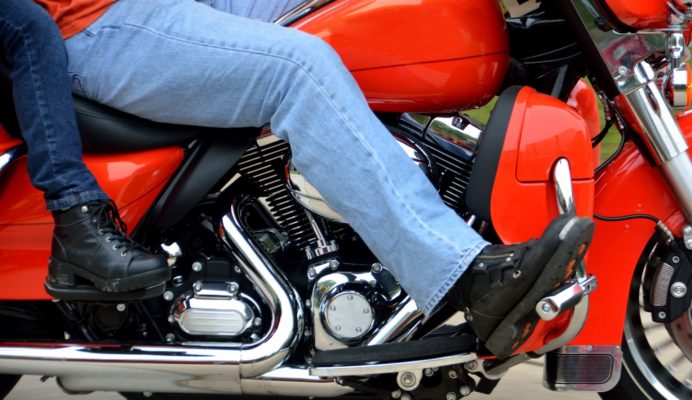Baby boomers are taking to the road on motorcycles and three-wheeled motorcycles in record numbers. How often are we driving along and glance over at the leather-clad motorcyclist heading down the highway with Born to Be Wild blaring, only to discover a grinning 50 or 60 year old zooming along on his brand-spanking new bike. Retirees, couples, and professionals of all types – yes even lawyers — are joining clubs, going on motorcycle trips as couples or signing up for charitable fundraising motorcycle rides.
For many of us who could never afford to own a motorcycle in college or university, or had to give one up when we started raising a family, the dream of owning a motorcycle may be on our bucket list. With commonly heard mantras like “50 is the new 30”, boomers are looking for new ways to stay young and fit, and frankly, have a whole lot of fun enjoying the adventures of the open road.
Motorcycle clubs are a great way to connect with other like-minded people, while organized rides for charitable groups raise funds for worthwhile causes. Well-promoted motorcycle events like “Friday the 13th” attract riders of all ages and can fill a vacation town with bikers faster than you can say “Easy Rider”!
Along with traditional motorcycles, boomers seem to be embracing the three-wheeled variety. Iconic names of the motorcycle world are producing these three-wheelers to meet the demand. These bikes are dubbed as Tricycle Motorcycles or Trikes due to the reverse tricycle design with three wheels which provide the bonus of balance, allowing the bike to stay upward, even when parked. The Ontario Government website (www.ontario.ca) classifies the three-wheeled motorcycle or tricycle this way: “designed with either a single front wheel and two rear wheels, or two front wheels and a single rear wheel. If you take a test on a three-wheeled motorcycle, you will get a class M licence with an M condition. The bike must travel on three wheels which are in contact with the ground, have straddled seating for the driver, use a handle bar for steering controls, have no more than four seats, have a gross vehicle weight of 1,000 kg or less and not have a structured partly or fully enclosing the driver and passenger, except in front of the driver and the seat rest.”
Whether your motorcyle has two wheels or three, extreme caution is needed on Ontario roadways. “Watch out for the other guy” is an important motto for all motorcyclists. Riders need to be extremely careful while riding as they are not always visible to other drivers. Wearing protective helmets and clothing is also an important safety consideration. Some jurisdictions, including Ontario, have Graduated Driver License (GDL) programs for motorcyclists.
Motorcycles are considered “Vulnerable Road Users”, by virtue of the lack of protection if struck by a vehicle. According to the Transport Canada website, www.tc.gc.ca, “Over the period 2004-2008, 13% of fatalities have been pedestrians while motorcyclists and bicyclists have accounted for 8% and 2% of fatalities respectively. In total, vulnerable road users account for almost a quarter of all road traffic fatalities in Canada.”
Transport Canada also reports that deaths amongst older motorcyclists increased, according to a study posted on their website which states that 23% of motorcyclists killed in crashes were 25 to 34 years of age while the number of fatalities among motorcyclists in the 45 to 54 age group increased a whopping 109% between 1996 and 2001 and 2004 to 2006 as ridership increased in this age group. (Source www.tc.gc.ca)
| According to a report on CBC News in August 2014 and posted on their website www.cbcnews.ca, many of the myths we have about motorcyclists in general are just not true. The story quoted a statement released by the Ontario Provincial Police which quoted Deputy Commissioner Brad Blair as saying: “The OPP believes that Ontario motorcyclists in general recognize that they are vulnerable road users and demonstrate safe, defensive driving.” The OPP also released data to dispel some common myths about motorcycle deaths. That myth about young inexperienced motorcyclists being the most vulnerable, at-risk drivers accounting for the largest number of crashes in Ontario? Wrong, states the OPP in the report. The fact is that from 2008 to August of 2014, only 16 of the 175 motorcyclists who died were under age 25. Surprisingly, the age group with the highest number of fatalities was the 45 to 54 demographic, which made up 48 of the 175 deaths. The second highest group was the 55 to 64 year group with 39 victims for a combination of the two older age groups accounting for almost half of the motorcycle-related fatalities.
The same OPP statement as reported on CBC News, also dispelled the myth that motorcyclists must have done something wrong to cause the crash. The fact is that between 2008 and 2014, 50 of the 175 motorcycle victims were driving properly at the time of the accident. (Source: CBC News, August 2014, www.cbc.ca) Motorcycle accidents can be caused by many things: potholes and improperly maintained roads, excessive speed, loss of control, driver error, and alcohol impairment. But often an accident is caused by the negligence of other drivers. Injuries sustained in motorcycle accidents are often severe, including catastrophic brain injury, spinal cord injuries, fractures, neurological injuries, amputations and death. Under Ontario’s No-Fault regime, victims of motorcycle accidents are entitled to make a claim for Statutory Accident Benefits. If you have been injured in a motorcycle accident, you may be entitled to benefits which can provide important protection for medical expenses, including rehabilitation and income replacement. You may also have the right to sue the at-fault driver in a tort action. Proving fault is a complex issue. At Horowitz Injury Law, we have nearly 35 years of experience in successfully handling motorcycle accident claims. Call us today at 416-925-4100 for a complimentary consultation to discuss your claim and get you on the road to pursuing the compensation you deserve. |




